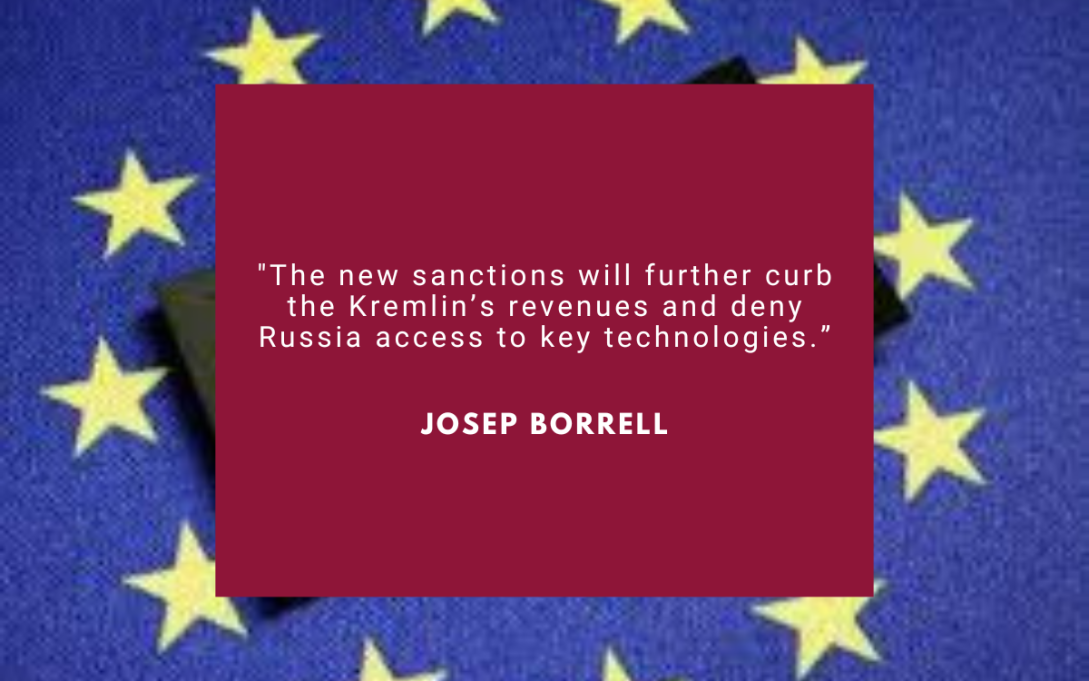Closing the tap on Russian gas re-exports

Our sanctions have already significantly weakened the Russian economy and are helping prevent Putin from accomplishing his plans to destroy Ukraine. To amplify these efforts, the European Union agreed yesterday on a new sanctions package, which for the first time targets one of Russia’s major sources of revenue, its liquefied natural gas (LNG) business.
The measures will prohibit the use of EU port infrastructure to re-load Russian LNG from one vessel to another, a practice known as trans-shipment. They will also sanction new Russian LNG projects by cutting off the delivery of EU goods, technology, and services. It will make their completion more difficult and costly.
Halting Russian LNG re-exports
Since Russia's full-scale invasion of Ukraine in February 2022, the EU has been steadily weaning itself off Russian fossil fuels. Already in 2022, we banned all coal and most crude oil imports. EU member states have also slashed imports of Russian natural gas by two-thirds, from 45% of all gas imports in 2021, to 15% of EU gas imports in 2023.
Despite these efforts, Russian gas has recently been making a quiet comeback, with Russian gas creeping up to 18% of EU imports in the first months of 2024. This uptick was largely driven by a growing inflow of Russian LNG. Of this Russian LNG reaching the EU, more than 20% is being re-exported to other parts of the world. This practice runs counter to the EU's goal to curb, as much as possible, the revenues the Kremlin derives from its energy exports to fund its war, and made new targeted sanctions necessary.
We expect that the ban on trans-shipments will have no repercussions on the EU’s security of supply, nor on the price of LNG on the global market, because Russia's LNG production is currently only a fraction of the global supply. The ban will however deal a blow to Russia's purse.
This is because Russian LNG terminals are located in the Arctic. Russia, therefore, uses specialised icebreakers to transfer LNG to warmer waters, where it is reloaded onto bigger ships. Until now, most of this activity has taken place in EU ports. Once the new sanctions enter into force, the Russian icebreakers will need to sail much longer distances to reach the next suitable facility to transfer the LNG into bigger ships. Consequently, they will face much higher operational costs (estimated to be up to 75% higher), and the volume of LNG effectively transported from Yamal, in the Arctic sea, to international clients will be reduced.
Alternatively, Russian vessels could sail to the Pacific; however, the Arctic Sea summer route is only viable for 3-4 months, thus relying on trans-shipment services for the rest of the year.
Putting the brakes on Russian LNG projects
Faced with a drop in demand in Europe - the endpoint of its gas pipeline network - Russia is currently massively expanding its LNG infrastructure in the Arctic region. It aims to become a global player in the LNG business. Currently, the Yamal facility is Russia’s largest LNG liquefaction plant. However, two LNG production projects are currently under construction in the same Arctic region. They could triple Russian LNG exports by 2030.
In response, the new restrictive EU measures will ban European companies from delivering advanced LNG technology and services to Russia to slow down the construction of these facilities, as well as of a new trans-shipment installation in Murmansk that could replace European ports.
With this new sanctions package, we are sending another clear signal that the Kremlin’s aggression against Ukraine will not be tolerated and that Russia will pay a steep economic price for its criminal activities. By targeting the LNG sector, we are striking at a key pillar of Russia's economy. The effects will not be instantaneous, but in the longer term they are a slow poison for the Russian economy and will limit Russia's ability to sustain its military aggression.
MORE FROM THE BLOG

"Une fenêtre sur le monde" - Blog du HR/VP Josep Borrell
Blog de Josep Borrell sur ses activités et la politique étrangère européenne. Vous pouvez également y trouver des interviews, des articles d'opinion, une sélection de discours et de vidéos.
